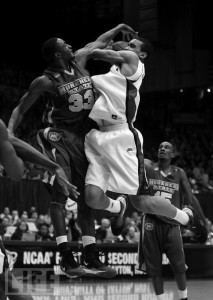“You’re an idiot.”
That’s what one of my friends said to me after I told him I was going to pick the 13-seed Morehead State University Eagles to defeat the heavily-favored 4-seed University of Louisville Cardinals in the first round of my 2011 NCAA Men’s Division I Basketball Tournament bracket.
So when game time came along for the Morehead State-Louisville matchup on Thursday, March 17, I had an extra incentive for gluing my eyes to the television screen: I wanted my friend to eat his words.
The first six minutes of the game brought nothing but smiles to my face, as the Eagles raced out to an early 10-0 lead. I could tell right off the bat that this was going to be one of those games that make the NCAA tournament the most exciting event in the world of sports.
But, as the first half progressed, Louisville worked their way back into the game, and the half ended with a deadlock 33-33 tie. The second half gave me anything but the optimism I felt in the first half. With 10:59 left, Louisville led 47-39.
The Eagles weren’t out, however, and proceeded to go on a 10-1 run and regain the lead. The teams exchanged leads three more times, until there were 24 seconds left in regulation.
The situation: Following a timeout, Louisville led 61-59, but Morehead State had the ball. For these teams, it was win or go home time. For my friend and I, it was idiot or not an idiot time.
The outcome: Morehead State inbounded the ball to Demonte Harper. The senior guard wasted a little bit of clock and then made his move. Harper dribbled to left, crossed over, and with 6.0 seconds left, took a three-point shot from the top of the key.
Harper drained the shot, giving the Eagles and me an improbable 62-61 win over the Cardinals and my friend, respectively.
It’s important to clarify that my friend is both sarcastic and humorous by nature. I thus did not take his “idiot” comment too seriously — well, maybe a little bit.
Whether or not he meant what he said, my friend taught a valuable lesson of how not to act when it comes to the NCAA tournament: assumingly.
Almost every year in recent memory, there has been at least one astronomically implausible upset in the NCAA Tournament. One simply cannot assume that any particular team is going to win any single game.
Last year, 9-seed University of Northern Iowa beat top-ranked University of Kansas, 69-67, in the second round. The year before, 13-seed Cleveland State University bested 4-seed Wake Forest University in the first round. The 2008 tournament saw 10-seed Davidson College make it to the Elite Eight, and who can forget 11-seed George Mason University’s run to the Final Four in 2006?
There is so much analysis that goes on with these brackets, with every sports media outlet spending hours reviewing the tournament field. College basketball “experts” claim to know what picks are smart, what picks are dumb and what will or won’t happen in the tournament.
The bottom line is that even though some may claim to have a better idea of what will happen, these “experts” are about as accurate as a fortune inside a fortune cookie — sometimes the fortune ends up being right, and sometimes it’s wrong.
Just look at renowned college basketball analyst and broadcaster Dick Vitale and CBS Sports senior writer Dennis Dodd. Both picked Louisville to go to the Final Four in this year’s tournament, which clearly can’t happen now.
Just pick the teams that you think are going to win, regardless of what anyone says. Trust your picks and follow your gut-feelings on games. You’re better off not even following the opinions of the so-called “experts,” because they are just as likely to pick winners as any amateur.
So if you want to pick a 16-seed to beat a 1-seed seed in the first round of the tournament, go ahead. Even though it has never happened before, I’m not going to be the one to claim that you’re an idiot.
Mulberg is a member of
the class of 2014.


